Select Language
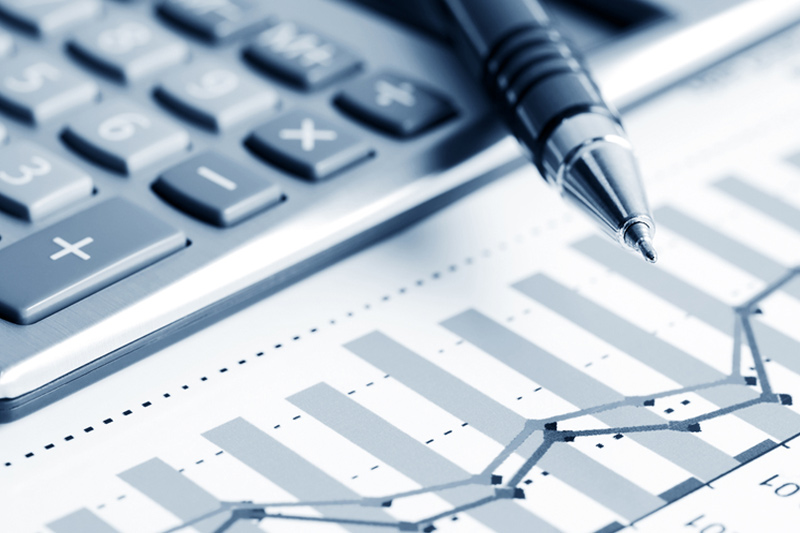
BEIJING (Reuters) - Prices of new homes in China climbed at their slowest pace in five months in June, a private survey showed on Monday, with a recent major government package of support measures for the country's ailing property sector having only a limited impact so far.
The average price for new homes across 100 cities edged up 0.15% month-on-month in June, weaker than a 0.25% gain in May, according to data from property researcher China Index Academy.
The value of new home sales at China's top 100 real estate companies slid 41.6% in January-June from the same period a year ago, it also said.
In May, Chinese authorities unveiled what they called a historic support package for the property sector that has been hit hard by a liquidity crunch since 2021 with many firms defaulting on debt.
The package further cut downpayment requirements and removed the floor for mortgage rates. Local governments can also now instruct state-owned firms (SOEs) to purchase completed unsold apartments from property developers and convert them into social housing.
The China Index Academy data also showed the average price of second-hand homes across 100 cities fell 0.73% in June from a month earlier, the 26th straight month of declines.

By Juliette Jabkhiro and Layli Foroudi
PARIS (Reuters) -Marine Le Pen's far-right National Rally (RN) party scored historic gains to win the first round of France's parliamentary election on Sunday, exit polls showed, but the final result will depend on days of horsetrading before next week's run-off.
The RN was seen winning around 34% of the vote, exit polls from Ipsos, Ifop, OpinionWay and Elabe showed, in a huge setback for President Emmanuel Macron who had called the snap election after his ticket was trounced by the RN in European Parliament elections earlier this month.
The RN's share of the vote was comfortably ahead of leftist and centrist rivals, including Macron's Together alliance, whose bloc was seen winning 20.5%-23%. The New Popular Front (NFP), a hastily assembled left-wing coalition, was projected to win around 29% of the vote, the exit polls showed.
The exit polls were in line with opinion surveys ahead of the election, and were met with jubilation by Le Pen's supporters. However, they provided little clarity on whether the anti-immigrant, eurosceptic RN will be able to form a government to "cohabit" with the pro-EU Macron after next Sunday's run-off.
A longtime pariah for many in France, the RN is now closer to power than it has ever been. Le Pen has sought to clean up the image of a party known for racism and antisemitism, a tactic that has worked amid voter anger at Macron, the high cost of living and growing concerns over immigration.
At Le Pen's Henin-Beaumont constituency in northern France, supporters waved French flags and sung the Marseillaise.
"The French have shown their willingness to turn the page on a contemptuous and corrosive power," Le Pen told the cheering crowd.
The RN's chances of winning power next week will depend on the political dealmaking made by its rivals over the coming days. In the past, centre-right and centre-left parties have teamed up to keep the RN from power, but that dynamic, known as the "republican front," is less certain than ever.
If no candidate reaches 50% in the first round, the top two contenders automatically qualify for the second round, as well as all those with 12.5% of registered voters. In the run-off, whoever wins the most votes take the constituency.
High turnout on Sunday suggests France is heading for a record number of three-way run-offs. These generally benefit the RN much more than two-way contests, experts say.
The horsetrading began almost immediately on Sunday night.
Macron called on voters to rally behind candidates who are "clearly republican and democratic", which, based on his recent declarations, would exclude candidates from the RN and from the hard-left France Unbowed (LFI) party.
Political leaders from the centre-left and far-left all called on their third-placed candidates to drop out.
"Our guideline is simple and clear: not a single more vote for the National Rally," France Unbowed leader Jean-Luc Melenchon said.
However, the centre-right Republicans party, which split ahead of the vote with a small number of its lawmakers joining the RN, gave no guidance.
POSSIBLE PRIME MINISTER
Jordan Bardella, the 28-year-old RN party president, said he was ready to be prime minister - if his party wins an absolute majority. He has ruled out trying to form a minority government and neither Macron nor the NFP leftist group will form an alliance with him.
"I will be a "cohabitation" Prime Minister, respectful of the constitution and of the office of President of the Republic, but uncompromising about the policies we will implement," he said.
The mood was gloomy at the Republique square in Paris, where a few thousand anti-RN protesters gathered at a rally of the leftist alliance on Sunday night.
Najiya Khaldi, a 33-year-old teacher, said she felt "disgust, sadness and fear" at the RN's strong results.
"I am not used to demonstrating," she said. "I think I came to reassure myself, to not feel alone."
Market reaction to Sunday's result was muted, with the euro gaining around 0.23% in early Asia-Pacific trading. Fiona Cincotta, senior markets analyst at London's City Index, described relief that the result yielded "no surprises."
"Le Pen had a slightly smaller margin than some of the polls had pointed to, which may have helped the euro a little bit higher on the open," she said. "Attention now is on July 7 to see whether the second round supports an absolute majority or not. So it does feel like we're a little bit in limbo."
COMPLEX CALCULUS
The RN was seen winning the most seats in the National Assembly, but only one of the pollsters - Elabe - had the party winning an absolute majority of 289 seats in the run-off.
Experts say seat projections after first-round votes can be highly inaccurate, and especially so in this election.
No nationwide official results were available on Sunday evening, but they were expected in the coming hours. Exit polls in France have tended to be highly accurate.
Voter participation was high compared with previous parliamentary elections, illustrating the political fervour Macron aroused with his stunning and politically risky decision to call a parliamentary vote.
At 1500 GMT, turnout was nearly 60%, compared with 39.42% two years ago - the highest comparable turnout figures since the 1986 legislative vote, Ipsos France's research director Mathieu Gallard said. It was unclear when the official turnout figure would be updated.

By Jihoon Lee
SEOUL (Reuters) - South Korea's factory activity growth quickened in June to the fastest in 26 months, as new orders jumped on improving global demand, a private-sector survey showed on Monday.
The purchasing managers index (PMI) for manufacturers in Asia's fourth-largest economy, compiled by S&P Global, rose to 52.0 in June, from 51.6 in May, on a seasonally adjusted basis.
It was the highest reading since April 2022, staying above the 50-mark, which separates expansion from contraction, for a second consecutive month.
"Another strong month of data provides further evidence that global industrial activity and trade are picking up," said Joe Hayes, principal economist at S&P Global Market Intelligence.
"Viewed as a bellwether for exports due to its integration in supply chains for key intermediate goods like batteries and semiconductors, South Korean manufacturing output and orders often provide leading signals for trends more broadly."
New orders expanded at the quickest rate since February 2022 on stronger demand both at home and abroad, with those from overseas increasing the most in five months, sub-indexes showed.
Asian countries including China, Vietnam and Japan, as well as other regions such as North America and Europe were cited in the survey as markets that yielded sales growth.
South Korea's exports, which have been growing since October led by demand for computer chips and from the United States, are recovering towards record-high levels, the finance minister said last week.
Output rose for a third straight month in June but at a slower rate than the month before. Stocks of finished goods were depleted by the most in nearly three years and backlogs of work rose by the most in almost two years, suggesting that factory capacity was somewhat stretched amid growing demand.
Meanwhile, inflation in input prices accelerated to the fastest in eight months, with companies attributing the rise to unfavourable exchange rate movements and a rise in raw material prices, namely for metals.
Manufacturers' optimism for the year ahead dropped to the weakest in six months, as concerns grew that domestic market conditions could hinder factory output despite positive sales forecasts.
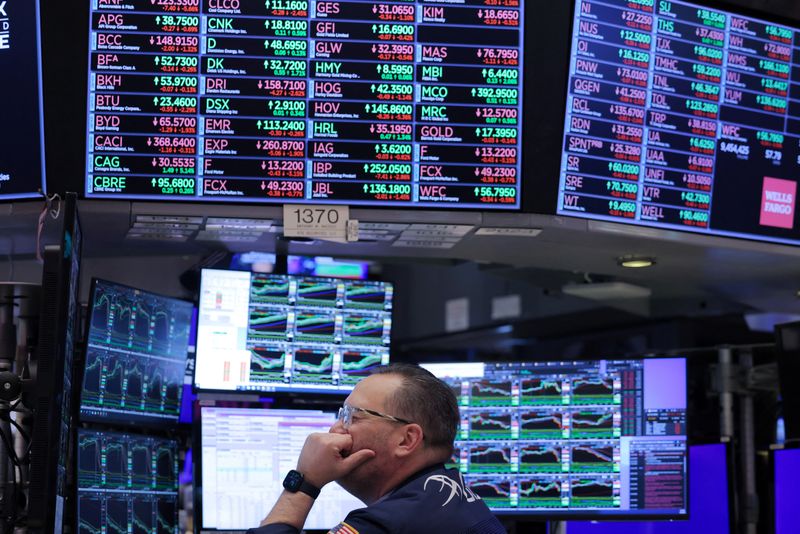
Investing.com -- Friday’s U.S. jobs report will be the highlight of what will be a holiday-shortened week as markets look for clarity on when exactly rate cuts could start. Comments by Federal Reserve Chair Jerome Powell will be closely watched, along with Wednesday’s minutes of the U.S. central bank’s latest meeting. Elections in France and the UK will also keep markets on high alert. Here’s your look at what's happening in markets for the week ahead.
U.S. jobs data
Investors will be focusing their attention on Friday’s nonfarm payrolls report as they look for fresh indications on when the Federal Reserve might start to cut interest rates.
Economists are expecting the U.S. economy to have added 189,000 jobs in June after a larger than forecast gain of 272,000 the previous month highlighted the resilience of the labor market.
The Fed kept rates unchanged earlier this month and pushed out the start of rate cuts to perhaps as late as December, as officials look for more convincing signs that inflation is pulling back to the central bank's target, or evidence that the labor market is cooling.
Ahead of the nonfarm payrolls data, a report on Tuesday is expected to show that job openings declined again in May, indicating that companies are having more success filling positions.
Powell, Lagarde comments; Fed minutes
Fed Chair Jerome Powell is to make an appearance at the European Central Bank’s annual forum in Sintra, Portugal on Tuesday.
Powell, along with ECB President Christine Lagarde is to participate in a panel discussion on "monetary policy in an era of transition" with investors on the lookout for any fresh insights on the future part of interest rates.
Inflation is receding after spiking in the first quarter but continues to run above the Fed’s 2% target.
Meanwhile, Wednesday’s minutes of the Fed’s June meeting will be parsed for the central bank’s view of the economic outlook and the factors influencing the monetary policy outlook.
Elections in France, UK
France goes to the polls on Sunday, the first round of its shock snap election that has roiled markets.
Investors will look out for any hints of the results of the second round a week later. But a 577-constituency race where candidates just need 12.5% of the vote to make it to the second round, also featuring three-way races, means uncertainty may prevail.
Meanwhile, polls predict a landslide British election win for the opposition Labour Party on Thursday, sending sterling back to levels not seen since 2016's Brexit vote.
Traders see a return to stability after heavy political turbulence during the Conservatives' 14-year rule and have speculated Labour leader Keir Starmer could rebuild trade links with Europe.
But it remains to be seen how large of a majority Starmer will be able to command in Parliament.
Eurozone inflation
The Eurozone is to release June inflation data on Tuesday, following Germany’s report on Monday, with economists expecting a slight slowdown in both the headline and underlying measures after an uptick in May.
The ECB is to publish the minutes of its June meeting, when it cut interest rates for the first time since September 2019, on Thursday.
Though the ECB began hiking interest rates later, the June cut put it ahead of the Fed on its march lower, as the world’s largest central bank remains stymied by above target inflation.
China PMIs
Official data on Sunday showed that manufacturing activity in China declines for a second month in June while services activity slipped to a five-month low, keeping alive calls for further stimulus as the world’s second largest economy struggles to gain momentum.
The Caixin manufacturing PMI, due Monday, is expected to tick lower.
Analysts expect China to roll out more policy support measures in the short term, while a government pledge to boost fiscal stimulus is seen helping kick domestic consumption into a higher gear.
--Reuters contributed reporting
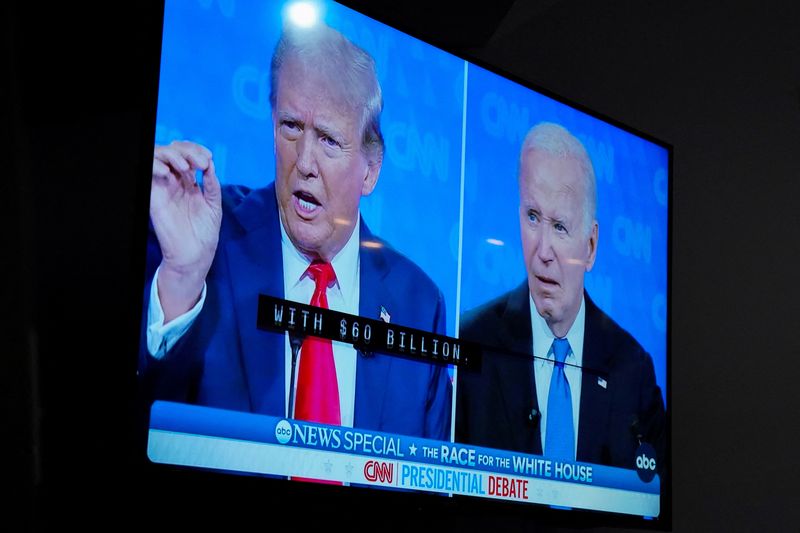
By Ann Saphir
(Reuters) - U.S. President Joe Biden and his Republican rival Donald Trump both took credit for what they said was a strong economy under their watch and blamed the other for punishing inflation as they battled on the debate stage before the Nov. 5 election.
"He's done a poor job and inflation is killing our country. It is absolutely killing us," said Trump, who was president from 2017-2021. Under his own watch, Trump said, "everything was rocking good."
Biden pinned inflation, which peaked at 9% two years ago and has since dropped to 3.25%, on Trump's handling of the COVID-19 pandemic, along with corporate greed.
"The economy collapsed" under Trump, Biden said, and when he came into office "what we had to do is try to put things back together again."
Massive disruptions from the COVID-19 pandemic, which began in March 2020, make comparing the economic records of the two rivals difficult.
But one thing is certain - inflation has been far higher under Biden than it was under Trump. There was not a single month under Trump in which consumer price inflation exceeded 3%, and for most of that time, the Federal Reserve - whose job it is to maintain stable prices - worried that inflation was too low.
Under Biden, inflation has been above 3% for all but his first three months in office, and was above 5% for more than half his term so far.
The damage from higher prices has been significant: even though wages have risen, the bigger weekly paychecks American workers take home buy less than they did when Biden came into office in 2021.
When inflation first began to take off in the spring of 2021, most analysts and policymakers at the Fed thought it would be transitory. But by late 2021, almost nobody thought so.
The Fed, in response, increased borrowing costs aggressively to bring down inflation, and prices are now no longer rising as fast as they were.
Despite higher interest rates, usually expected to cool economic growth, the labor market has been tight, with the unemployment rate at or below 4% for the last two years, the longest such run since the 1960s.
As inflation has fallen, average wage growth in the U.S. has exceeded inflation for more than a year now, with lower income workers - such those in the leisure and hospitality sectors - among those whose real wages have risen the most.
Economists blame the inflation surge on a broad set of factors, including surging demand after the pandemic shutdowns, households flush with cash from pandemic-era stimulus delivered under both Trump and Biden, and lingering disruptions to trade and supply chains from both the pandemic and Russia's invasion of Ukraine.
Quarterly economic growth during Trump’s first three years, and during Biden’s term beginning in 2021, each compounded at an almost identical rate that annualizes to around 2.7%.

By Makiko Yamazaki and Takaya Yamaguchi
TOKYO (Reuters) -Japan appointed a new top foreign exchange diplomat on Friday as the yen plumbed a 38-year low against the dollar, heightening expectations of imminent market intervention by Tokyo to shore up the battered currency.
Atsushi Mimura, a financial regulation veteran, replaces Masato Kanda, who launched the biggest yen-buying intervention on record this year.
The change is part of a regular personnel reshuffle conducted every year and comes as officials ramped up their warnings about intervention.
Finance minister Shunichi Suzuki said on Friday authorities were "deeply concerned" about the impact of "rapid and one-sided" foreign exchange moves on the economy.
The yen slid past 161 per dollar on Friday to its weakest since 1986.
Speaking at a regular press conference, Suzuki said authorities would respond appropriately to excessive currency moves and that confidence in the Japanese currency is maintained.
"The government is closely monitoring developments in the foreign exchange market with a high sense of urgency," Suzuki said, adding efforts to continue forging ahead with fiscal reform is crucial.
The yen fell to 161.155 per dollar on Friday morning, with neither an overnight drop in U.S. yields nor data showing solid consumer price gains in Tokyo arresting the slide.
Japanese authorities are facing renewed pressure to stem sharp declines in the yen as traders focus on the interest rate divergence between Japan and the United States.
Tokyo spent 9.8 trillion yen ($60.91 billion) intervening in the foreign exchange market at the end of April and early May, after the Japanese currency hit a then 34-year low of 160.245 per dollar on April 29.
NEW DIPLOMAT
Mimura's appointment as top FX diplomat will take effect on July 31 after the meeting of the Group of 20 finance ministers and central bank governors in Rio de Janeiro from July 25.
Little, however, is known about his stance on currency policy.
Currently head of the ministry's international bureau, the 57-year-old will become vice finance minister for international affairs - a post that oversees Japan's currency policy and coordinates economic policy with other countries.
Having spent nearly a third of his 35-year government career at Japan's banking regulator, Mimura has expertise and international ties in the area of financial regulation.
During his three-year stint at the Bank for International Settlements in Basel, Mimura worked with Mario Draghi to set up the Financial Stability Board in the midst of the 2008-2009 global financial crisis to reform financial regulation and supervision.
At the finance ministry, he worked on the revision to the law over the Japan Bank for International Cooperation last year to expand the scope of the state-owned bank and make foreign companies key to Japan's supply chains eligible for loans from the bank.
Mimura was also part of a government team that briefed foreign investors on the 2020 revisions to foreign ownership rules to dispel the notion that tighter rules were meant to discourage foreign investment in Japan.
Mimura takes over from Kanda who, during his three-year tenure, actively jawboned markets to combat sharp yen falls he described were driven by speculators.
Kanda oversaw a bout of yen-buying intervention in late April and early May, in which Japan spent $62 billion to prop up the sagging currency.
A weaker yen is a boon for Japanese exporters, but a headache for policymakers as it increases import costs, adds to inflationary pressures and squeezes households.

SAO PAULO (Reuters) - Brazilian President Luiz Inacio Lula da Silva on Thursday signed into law a 20% tax on international purchases of up to $50, despite having previously criticized the measure.
Lula signed the bill into law during a meeting of his Council for Sustainable Economic and Social Development in Brasilia.
The tax on online international low cost purchases was a request from Brazilian retailers who argue that they are being victims of unfair competition, mainly against Chinese e-commerce giants.
In May, Lula had said he was willing to negotiate with lawmakers about taxing cross-border low cost purchases of up to 50 dollars, but he did not rule out the possibility of vetoing the measure. At the time, the president pointed out that the measure could impact people with lower income.
The highly controversial tax was attached to a bill that creates the so-called Green Mobility and Innovation program (Mover).
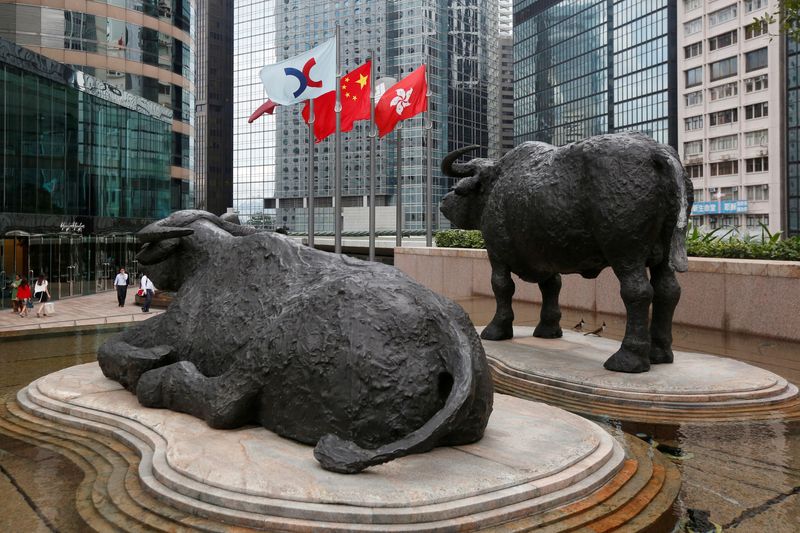
By Rae Wee
SINGAPORE (Reuters) - Asian stocks were headed for a fifth straight month of gains on Friday, bolstered by the growing view that cooling inflation in the United States would allow the Federal Reserve to ease rates later this year.
Friday is packed with risk events for markets after a relatively subdued rest of the week, with U.S. Democratic President Joe Biden and his Republican rival Donald Trump set to take the stage at 0100 GMT for their first debate of the year ahead of November's U.S. presidential elections.
Chinese markets, in particular, will be looking out for comments about the trade relationship with Beijing, which has further soured in recent years.
On the data front, figures for May's U.S. core personal consumption expenditures (PCE) price index - the Fed's preferred measure of inflation - are due later on Friday, and could offer further clarity on the U.S. rate outlook.
"If tonight's core PCE inflation were to come in much hotter than the 2.6% expected and after upside surprises to Canadian and Australian inflation data this week, it would inflame concerns that the decline in global inflation has bottomed out and may have reaccelerated in some countries," said Tony Sycamore, a market analyst at IG.
MSCI's broadest index of Asia-Pacific shares outside Japan rose 0.06% early in the Asian session, and was on track to gain some 3.2% for the month, its best performance since February.
Growing expectations of an imminent Fed easing cycle and momentum from the artificial intelligence boom have sparked a risk rally across stock markets and catapulted Wall Street to record highs, in turn lifting Asian shares.
Traders are now pricing in a 64% chance of a first Fed cut in September, up from 50% a month ago, according to the CME FedWatch tool.
Japan's Nikkei jumped 0.78%, reversing some of its losses from the previous session. It was eyeing a monthly gain of 3%, helped by a weak yen and a rally in technology stocks.
S&P 500 futures and Nasdaq futures both ticked higher, rising 0.18% and 0.3%, respectively.
In currencies, the yen continued to languish near a 38-year low on the weaker side of 160 per dollar, leaving markets on alert for any intervention from Japanese authorities to prop up the currency.
The yen was last marginally higher at 160.68 per dollar, but was set to lose more than 2% for the month, as it continues to be hammered by stark interest rate differentials between the U.S. and Japan.
"Considering that the current pace of depreciation is slower than in April, there should be no reason why 160 has to be the line in the sand," said Vincent Chung, associate portfolio manager for T. Rowe Price's diversified income bond strategy.
"Most expectations suggest that intervention would likely occur if there were a quick depreciation to 163."
Tokyo spent 9.79 trillion yen ($60.94 billion) at the end of April and in early May to push the yen up 5% from its then 34-year low of 160.245.
Data on Friday showed core consumer prices in Japan's capital rose 2.1% in June from a year earlier, highlighting the challenge the Bank of Japan faces in timing its next interest rate hike, as cost pressures from the weak yen keep inflation above its 2% target but also hurt consumption.
The euro was last 0.04% higher at $1.0707, though it was headed for a 1.3% monthly decline as the common currency continues to be weighed by political turmoil in the bloc, with France's snap election due to kick off this weekend.
In commodity markets, gold has felt the burden of a firm dollar and fell 0.14% to $2,324.12 an ounce. [GOL/]
Brent crude oil futures rose 0.24% to $86.60 a barrel, while U.S. West Texas Intermediate crude futures gained 0.29% to $81.97 per barrel.

By Jonathan Stempel
NEW YORK (Reuters) - Ten large banks including Bank of America, Goldman Sachs and JPMorgan Chase (NYSE:JPM) will pay $46 million to settle a long-running antitrust lawsuit accusing them of conspiring to rig the now $465.9 trillion market for interest rate swaps.
Lawyers for investors filed a preliminary settlement to end the eight-year-old nationwide case on Thursday in Manhattan federal court.
The settlement requires approval by U.S. District Judge Paul Oetken, and boosts the value of all settlements in the case to $71 million.
Other settling banks include Barclays, BNP Paribas (OTC:BNPQY), Citigroup, Deutsche Bank, Morgan Stanley, NatWest and UBS.
Investors led by the city of Baltimore and pension funds in Chicago, Los Angeles and Michigan accused the banks of trying from 2013 to 2016 to corner swaps trading, in part by boycotting three upstart platforms that offered better prices and let buy-side investors trade with each other.
This allegedly led to "tremendous profits" for the banks because of their role as dealers, primarily in the form of bid/ask spreads, the investors said.
Credit Suisse, now part of UBS, agreed in 2022 to pay $25 million to settle investors' claims. A different judge dismissed a 12th bank, HSBC, as a defendant in 2017.
All of the banks have denied wrongdoing.
Oetken's refusal in December to certify a class action made the investors' case more difficult, because it's often more costly and not worth the trouble for individual investors to sue on their own.
Lawyers for the investors did not immediately respond to requests for comment. They called the settlement an "excellent recovery" given the challenges of further litigation, oourt papers show.
Interest rate swaps let parties exchange future interest payments, typically by exchanging a fixed rate for a floating rate, to manage risk or bet on whether rates will rise or fall.
The case is part of more than a decade of litigation in Manhattan accusing big banks of colluding in various markets including interest rate benchmarks, U.S. Treasuries, currencies and commodities.
The case is In re: Interest Rate Swaps Antitrust Litigation, U.S. District Court, Southern District of New York, No. 16-md-02704.
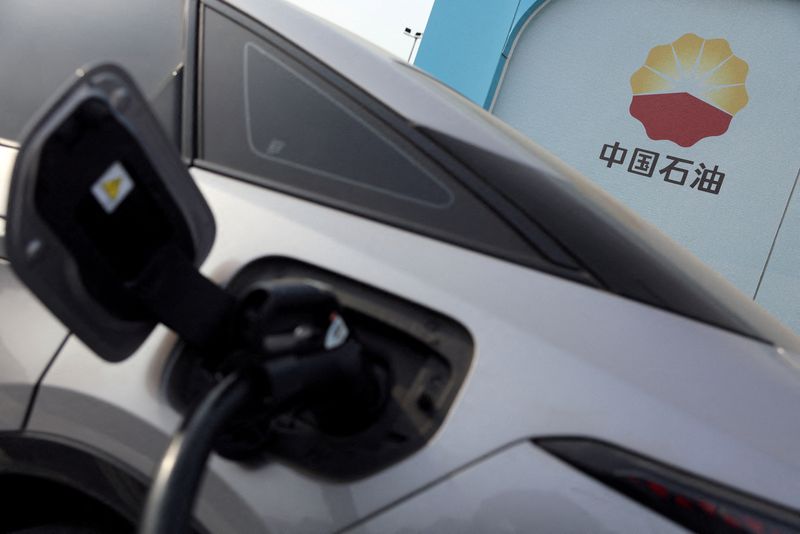
BEIJING (Reuters) - China hopes to reach mutually acceptable solutions through negotiation with the European Union on planned tariffs on Chinese electric vehicles to avoid escalation of trade friction, the Chinese commerce ministry said on Thursday.
Working teams from both sides have maintained close communication to expedite relevant work, ministry spokesperson He Yadong said at a news briefing.

